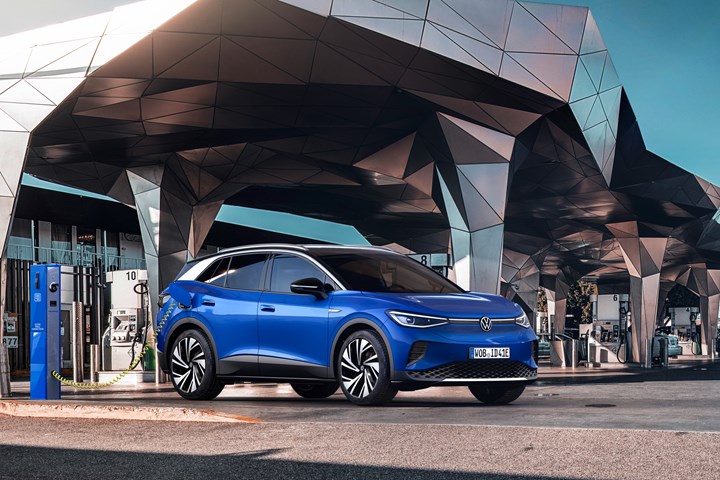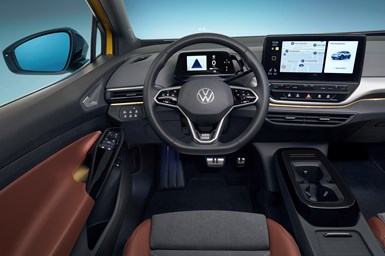The Volkswagen ID.4: What You Need to Know
It was officially unveiled and is ready for order. What Scott Keogh, CEO, Volkswagen Group of America, calls “The most important launch for VW since the Beetle”
#aluminum
What is it?
A compact electric SUV, Volkswagen’s first long-range EV in the U.S. market.

The VW ID.4. Not the compact SUV of the future. You can order it right now. (Images: VW)
“Long range”?
Estimated to be 250 miles.
What is it based on?
The MEB platform—the modular electric drive architecture that VW developed specifically for electric vehicle applications.
Why does that matter?
Because unlike, say, the eGolf, which was a Golf that was retrofitted with an electric powertrain, the ID.4 is specifically meant to be an EV.
What powers the ID.4?
The launch version has a rear-mounted AC permanent-magnet synchronous motor. It produces 201 hp and 228 lb-ft of torque. It drives the rear wheels. (All-wheel drive will be coming soon.)
Batteries and charging?
There is an 82-kWh battery. It consists of 288 pouches that are organized in 12 modules. It is packaged in an aluminum matrix box that is located within an extruded aluminum frame, and there is a replaceable aluminum underbody panel beneath it.
Using the 11-kW onboard charger, the battery charges at a rate of 33 miles per hour. It will be charged to full in 7.5 hours with a Level 2 charger (home or public). With a DC-fast charging station—as in 125 kW charging—a battery with 5% charge can go to 80% in about 38 minutes. (VW is offering three years of fast charging via the Electrify Network for those getting an ID.4.)

Yes, it is an EV. But also an SUV. Which means cargo capacity. In this configuration, 64.2 cubic feet of capacity.
Dimensions?
It has an overall length of 180.5 inches; a 108.9 -inch wheelbase; is 64.4 inches high; and it is 72.9 inches wide.
Cargo volume?
It offers 30.3 cubic feet behind the second row and 64.2 cubic feet with the seats folded.

On the one hand, futuristic. On the other hand, familiar. And speaking of hands, that center screen can be controlled with gesture control.
Interior tech?
There is a 5.3-inch digital driver display instead of an instrument cluster; there are touch-sensitive controls on the steering wheel to select things on the display. A 10-inch infotainment display is in the middle of the IP for navigation, entertainment and the like (it can be upgraded to a 12-inch display). Control of the screen can be performed with gestures. There is standard natural voice control: “Hello, ID., turn up the heat.”
Operational tech?
Includes the IQ.DRIVE suite of driver assistance tech, including Forward Collision Warning and Autonomous Emergency Braking with Pedestrian Monitoring (Front Assist); Blind Spot Monitor (Side Assist); Rear Traffic Alert; Adaptive Cruise Control (ACC); Lane Keeping System (Lane Assist); Travel Assist; and Emergency Assist. The ID.4 also provides Dynamic Road Sign Display; Park Distance Control; and High Beam Control (Light Assist).
Price?
MSRP is $39,995. Then there are potential tax credits (e.g., the Federal $7,500).
Where is it built?
Presently a plant in Zwickau, Germany. In 2022 it will be built at the Volkswagen Chattanooga Assembly Plant in Tennessee. VW is spending ~$800-million at the plant to prepare for the production.
The competition?
Well, there’s Tesla. Of course. But when asked about it, Scott Keogh, CEO, Volkswagen Group of America, noted, “The Beatles needed the Rolling Stones. The Rolling Stones needed the Beatles.” Both, of course, benefited from the other.
RELATED CONTENT
-
Aluminum Sheet for EV Battery Enclosure
As the number of electric vehicles (EVs) is about to increase almost exponentially, aluminum supplier Novelis is preparing to provide customers with protective solutions
-
On The Jeep Grand Cherokee, 2022 Nissan Pathfinder, and More
An inside look at the Detroit Assembly Complex-Mack; a innovative approach to waste-free, two-tone painting; why a forging press is like an F1 car; and other automotive developments.
-
Frito-Lay, Transportation and the Environment
Addressing greenhouse gas reduction in the snack food supply chain


.jpg;width=70;height=70;mode=crop)






